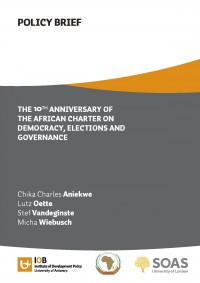The 10th Anniversary of the African Charter on Democracy, Elections and Governance

The African Charter on Democracy Elections and Governance (ACDEG) was adopted on 30 January 2007 as the African Union’s main normative instrument to set standards for better governance across the continent. It came into force in February 2012 after ratification by fifteen (15) States. As of September 2017, the Charter has been ratified by thirty (30) and signed by fortyfive (45) out of fifty-five (55) States. The ACDEG is different from previous instruments as it combines, in a holistic manner, the key elements of democracy, human rights and governance. Its objectives are to enhance the quality of elections in Africa, promote human rights, strengthen the rule of law, improve political, economic and social governance, and address the recurrent issues relating to unconstitutional changes of government in the continent. The ACDEG has been the impetus for various policy and institutional initiatives at the level of the African Union (AU) and the Regional Economic Communities (RECs), and has become the yardstick upon which Member States’ democratic governance progress is measured. One notable outcome from the Charter is the development of the African Governance Architecture (AGA), which is the overall political and institutional framework for promoting and strengthening democracy, good governance and human rights in Africa. AGA provides the platform through which different Organs and Institutions of the African Union support the implementation of the provisions of the Charter at the Member State level. While the ACDEG has led to changes in some Member States’ approach to democracy and governance, in other Member States it has had limited impact. The level of acceptance and implementation of the ACDEG remains highly uneven, which constitutes one of the key challenges in making the Charter’s objectives a reality across Africa.
